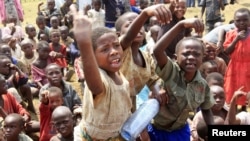GENEVA — U.N. aid agencies have reported more than 200,000 people have fled recent fighting in the Democratic Republic of Congo. The agencies said they are deeply concerned by the deteriorating situation and their inability to get humanitarian assistance to the thousands of newly-displaced in North Kivu province.
The violent rebellion by hundreds of Congolese Tutsis who defected from the DRC army in March is taking a heavy toll on civilians. The United Nations estimates 220,000 people have fled their homes because of fighting in North Kivu province, in the eastern part of the country. Tens of thousands of refugees have crossed into neighboring Uganda and Rwanda.
A spokesman for the U.N. office for coordination of humanitarian affairs, Jens Laerke, said OHCA and other aid agencies are trying to find out exactly where the hundreds of thousands of displaced Congolese are now.
“What often happens in these situations where we have ongoing conflict is that people are displaced for a shorter period of time. So, they may leave their villages in anticipation of hostilities, then they return maybe a few hours later," said Laerke. "But they are displaced for a period of time. They may be displaced to another location outside of their place of origin. So, it is an extremely fluid and confusing situation at the moment.”
Laerke said aid agencies need to assess the humanitarian needs of those who are newly displaced, but fighting is making it extremely difficult to do that.
The U.N. also is concerned, he said, about reports of children being recruited into armed groups in a number of towns around Rutshuru. And fears are growing that insecurity is likely to spread and destabilize other towns in North Kivu.
The World Food Program suspended deliveries of food aid this week to over 55,000 people at Walikale in North Kivu, due to the lack of security and restrictions on U.N. staff's movement.
WFP spokeswoman Elizabeth Byrs said her agency plans to resume food delivery soon to 180,000 internally displaced in Walikale and 31 U.N. refugee camps across Masisi and Rutshuru.
“The food delivery will start early next week. We resume because we temporarily suspended in Walikale and the rest of the distribution is ongoing," said Byrs. "But we still need 600 metric tons of food - supplementary food - per month in the coming weeks. That is why we will need more contributions.”
The United Nations is increasing its original appeal by 10 percent to $791 million because of the escalation of violence in North Kivu in the past few weeks
Government authorities in North Kivu accuse Rwanda of fueling the conflict by supporting the rebel group M23. Rwanda denies allegations that it is supporting the Tutsi rebels, but a recent report by U.N. experts told of "substantial evidence" that Rwanda is supporting armed groups in the area.
U.N. Secretary-General Ban Ki-moon has phoned Rwandan President Paul Kagame to voice his concern and to urge him to end his support for the rebels.
The violent rebellion by hundreds of Congolese Tutsis who defected from the DRC army in March is taking a heavy toll on civilians. The United Nations estimates 220,000 people have fled their homes because of fighting in North Kivu province, in the eastern part of the country. Tens of thousands of refugees have crossed into neighboring Uganda and Rwanda.
A spokesman for the U.N. office for coordination of humanitarian affairs, Jens Laerke, said OHCA and other aid agencies are trying to find out exactly where the hundreds of thousands of displaced Congolese are now.
“What often happens in these situations where we have ongoing conflict is that people are displaced for a shorter period of time. So, they may leave their villages in anticipation of hostilities, then they return maybe a few hours later," said Laerke. "But they are displaced for a period of time. They may be displaced to another location outside of their place of origin. So, it is an extremely fluid and confusing situation at the moment.”
Laerke said aid agencies need to assess the humanitarian needs of those who are newly displaced, but fighting is making it extremely difficult to do that.
The U.N. also is concerned, he said, about reports of children being recruited into armed groups in a number of towns around Rutshuru. And fears are growing that insecurity is likely to spread and destabilize other towns in North Kivu.
The World Food Program suspended deliveries of food aid this week to over 55,000 people at Walikale in North Kivu, due to the lack of security and restrictions on U.N. staff's movement.
WFP spokeswoman Elizabeth Byrs said her agency plans to resume food delivery soon to 180,000 internally displaced in Walikale and 31 U.N. refugee camps across Masisi and Rutshuru.
“The food delivery will start early next week. We resume because we temporarily suspended in Walikale and the rest of the distribution is ongoing," said Byrs. "But we still need 600 metric tons of food - supplementary food - per month in the coming weeks. That is why we will need more contributions.”
The United Nations is increasing its original appeal by 10 percent to $791 million because of the escalation of violence in North Kivu in the past few weeks
Government authorities in North Kivu accuse Rwanda of fueling the conflict by supporting the rebel group M23. Rwanda denies allegations that it is supporting the Tutsi rebels, but a recent report by U.N. experts told of "substantial evidence" that Rwanda is supporting armed groups in the area.
U.N. Secretary-General Ban Ki-moon has phoned Rwandan President Paul Kagame to voice his concern and to urge him to end his support for the rebels.




